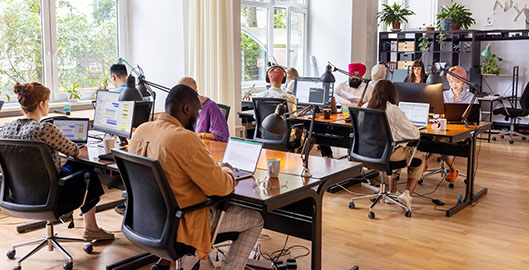Caption: Australian workplaces are facing new pressures
Caption: With new research revealing 38% of surveyed employees often feel fatigued and burnt out at work*. That equates to 2.9 million Australian employees.
The research was commissioned by Allianz and conducted by YouGov in accordance with the Australian Polling Council standard. The survey is a nationally representative sample comprised of 1500 employees (middle managers and below) and 521 managers (senior managers and above) in Australia aged 18 years and older.
Caption: And claims data from Allianz Australia shows that days off due to mental health have increased 39% since pre-pandemic times.
Workers Compensation claims data comparing days off for active primary psychological claims from July 2018 to June 2023, across all Allianz portfolios including Allianz Australia's Underwritten Workers’ Compensation, NSW Managed Fund (for both private and public sector employees) and Victorian Managed Fund Portfolios. I think there has been a permanent shift in the workplace during the pandemic because people had time to reflect and look inward.
Amy Rutstein, former office worker: I left my most recent role because I had enough of the pressure and I saw that affect on my health and it wasn't fair to myself. Most importantly.
Caption: Introducing the workplace realignment
Julie Mitchell, Chief General Manager of Personal Injury, Allianz Australia: Organisations are responding in a positive way to workplace mental health. But in the face of increasing complexity and more generations working alongside each other, there is a real shift for organisations to respond to workplace mental health. The Workplace Realignment encourages employees and managers to work together on understanding what their evolving needs are in the workplace to create mentally healthy workplaces. At Allianz we believe that the expectations on employees and managers continue to shift. Therefore, we encourage organisations to think through practical solutions that can improve the mental health outcomes for their employees.
Dr. Mark Cross, Consultant Psychiatrist: Employees want workplaces to be more empathic, emotionally intelligent places, so that speaks directly to culture. Culture needs to shift.
Julie Mitchell: That's true.
And also organisations can work to create psychologically safe workspaces for their people, where individuals can bring their true self to work that will generate creativity, productivity and help contribute to a healthy workplace environment.
It is crucial for organisations to continue to invest in holistic employee value propositions and mental health policies and procedures. We also know if changes aren't made, we're likely to see an increase in psychological injuries and ongoing employee turnover.
Caption: This is the equivalent of 1.4 million employees saying they are very likely to resign
Caption: Keep scrolling to learn how you can spark a Workplace Realignment.









